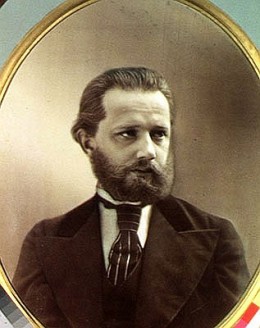История рода Фон Мекк
Tchaikovsky & von Meck: Romantic Music Part 12
Peter Ilyich Tchaikovsky 1840-1893 (2)
There were always “two” Tchaikovskys. One was Tchaikovsky the public figure, a great and talented composer, ultimately world-famous for being the creator of so much wonderful and memorable music. Then there was the private Tchaikovsky, a gay man who was very depressed about it, and who spent money like water, more than likely on unknown men that he met and had relations with. For he was deathly afraid of a public scandal, so he lived alone and kept his private life as secret as possible, although those close to him knew the true story. Homosexuality—sexuality of all kinds, actually—was not something that was discussed openly, which is tough for us to wrap our minds around today. But I think we can all understand how Tchaikovsky desired to please his supportive father, who wanted his son to marry and have children, and who just could not fathom why a handsome, intelligent, talented man like the composer had not done this.
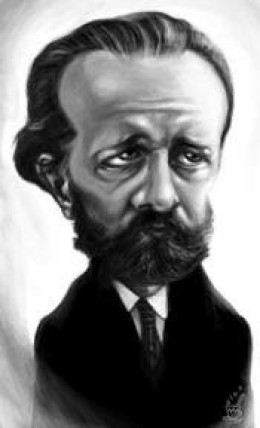
Does life imitate art, or does art imitate life?
Before we proceed to the direct relevance of this question (Don’t worry, we won’t try to solve this age-old mystery here!) we should note that Tchaikovsky began to compose operas in the late 1860s. In 1877 he started work on Eugene Onegin(1879), an opera that has retained its solid position in the standard repertoire, and whose drama turns on an adoring letter sent by the heroine Tatiana to the protagonist Onegin—who spurns her. This character, because of his coldness, ends up killing his best friend and being morbidly unhappy.
Now, it was just about this exact same time when Tchaikovsky, an extremely sensitive individual, received more than one adoring, even worshiping, love letter from a former piano student, Antonina Ivanovna Miliukova, a simple soul who had no idea about the composer’s true sexuality and probably wouldn’t have understood it if he had told her. The story goes that Tchaikovsky, who did not want to end up like Eugene Onegin, did not spurn the poor girl and agreed to marry her. Apparently he hoped that by doing this he would become “normal” just like anyone else.
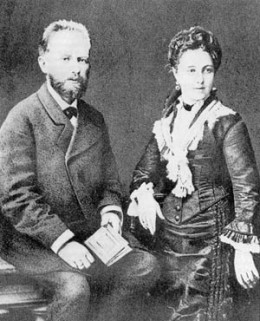
Marrage to Antonia Ivanovna Miliukova
This was not exactly a marriage made in heaven and, given the difficulty of divorce in Russia at that time, although they stayed married for the rest of their lives, they lived together for less than three months. As we have mentioned there were people close to Tchaikovsky who knew what the composer was really like. One of these was Nikolai Rubenstein, brother of St. Petersburg Conservatory director and famous composer Anton, and the director of the Moscow Conservatory—the man who had given Tchaikovsky the teaching job there and was a strong champion of his music.
One afternoon, when Antonina Ivanovna was expecting her husband to come home (By this time, Tchaikovsky had flown the coop to Switzerland!), Nikolai Rubenstein and one of the composer’s brothers, Anatoly, showed up unexpectedly. Without mincing words Rubenstein told the hapless woman about her husband’s real sexuality. Whether she comprehended what he told her right then is open to question. Today—like so many traditional “myths” and “legends”—academics seem to “pooh-pooh” the connection between the letter in Eugene Onegin and Tchaikovsky’s marriage. There were in fact a number of reasons why the composer took this disastrous step. But there is absolutely no doubt whatsoever that the whole thing was triggered by letters from Antonina Ivanovna at the time he was deeply involved with Onegin.
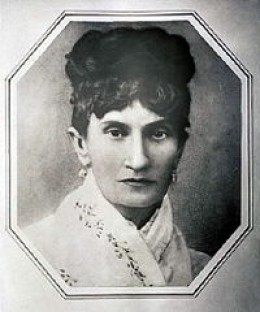
In walked an Angel
Tchaikovsky’s failed marriage puts the composer as a man into perspective—somewhat. In other words no story about him can purport to be complete without mention of this woman in his life, even though his relationship with her was doomed from the start. Given then who Tchaikovsky was as a man (the “private Tchaikovsky”), it is a little odd—and definitely ironic—that neither is a story of his life complete without a discussion of yet anotherwoman in the composer’s life—Nadezhda von Meck, his great benefactress.
Almost all great artists in the Western tradition have had their financial benefactors or “angels” going all the way back to the Greek tragedians. This is one phenomenon that was not among the changes that came with Democracy, Napoleon and the Industrial Revolution and all the technological miracles of the 1800s. Even the great Verdi needed help to get started. Tchaikovsky, who was a poor money manager especially needed financial help. Part of his problem was that he needed the job at the Moscow Conservatory because he needed a salary to pay the rent, even when his compositions were selling like crazy. And because he had to hold down the job, he couldn’t put more effort into composing. But then Nadezhda von Meck entered the picture.
Nadezhda von Meck was a very strong and very rich woman who had inherited her husband’s vast railroad holdings at his death in 1876. Actully she was perhaps more responsible for the acquisition of this fortune than her husband, who appears to have been a very talented engineer but had shown himself to be an underachiever as a businessman until Nadezhda gave him a sharp kick in the pants. She knew that it was time for railroads in Russia.
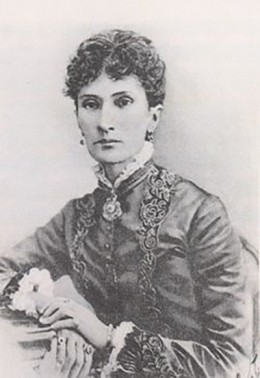
Dedicates 4th Symphony to von Meck
Besides being a shrewd businesswoman and domineering mother of 11 children, she was also an amateur pianist and lover of the arts. A person who never came to grips with any kind of sexuality, von Meck felt that Tchaikovsky was a kindred spirit when his marriage failed so badly and the composer seemed to be resolved to live alone. She began to subsidize him substantially around then because Tchaikovsky dedicated his Fourth Symphony (one of the greatest works of its kind) to her in 1878.
Soon von Meck was funding Tchaikovsky to the tune of 6,000 rubles per year—a king’s ransom!—and more than enough for him to quit his teaching job and focus all his energy on music. There was just one condition attached to this arrangement—that they would never meet. Except by the slightest of accidents, with no words exchanged, Tchaikovsky and von Meck never did meet in the 13-plus years that she patronized him. If she was hoping to inspire him to compose some great music, she certainly got her money’s worth—see the pieces listed and their dates below.
Once again it was probably Tchaikovsky’s lifestyle more than anything else that brought matters to the point where von Meck was forced to end supporting the composer. Other issues were also greatly in play. For one, Tchaikovsky’s neice Anna had married one of von Meck’s sons. Initially this was a great source of joy for the rich patroness. But while she had been used to forcing her iron will on her other children, Anna would have none of it and actually balked often against her mother-in-law’s wishes.
Then there was the problem with the von Meck fortune. Possibly through mishandling by Nadezhda’s oldest son Vladimir, by 1890 it was nowhere as significant as it once was. And here the matriarch of the family was giving 6,000 rubles a year to Tchaikovsky, who was also now getting a comfortable pension from Czar Alexander III! It is said that the von Meck children finally stood up against their mother (whose health was rapidly deteriorating from tuberculosis) and threatened to make public Tchaikovsky’s homosexuality unless she stopped paying him the annual stipend. She stopped in 1890.
Tchaikovsky - Piano Concerto No 1 in B-flat minor, Op 23
More great Tchaikovsky music:
Concertos:
- Op. 23 Concerto No. 1 in B-flat-minor for Piano and Orchestra 1875 One of the composer’s most famous pieces, it features the theme from which the well-known song “Tonight We Love” is taken.
- Op. 33 Rococo Variations for Cello and Orchestra 1877 (At least I always think of it as a concerto!) For virtuosos only!
Opera - Op. 24 Eugene Onegin 1879 Based on Puskin’s long poem this opera is tuneful with a gripping drama!
Orchestral works:
- Op. 29 Symphony No. 3 in D 1875
- Op. 36 Symphony No. 4 in F-minor 1878 This is one of the greatest symphonies ever written. Each of its four movements is a gem that you’re sure to enjoy - appropriately dedicated to his generous patroness Nadezhda von Meck.

